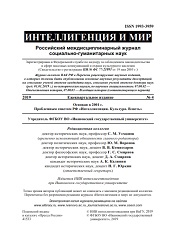Профессиональные школы Петра I: новаторство или продолжение традиций?
Professional schools of Peter I: innovation or continuation of traditions?
Author(s): Nikolay Georgievich YurkinSubject(s): Vocational Education, History of Education, State/Government and Education, 18th Century
Published by: Ивановский государственный университет
Keywords: public policy in the field of education; Peter I; navigation school; artillery school; engineering school; Naval Academy; logistics and personnel support of educational institutions;
Summary/Abstract: The article analyses the peculiarities of logistics, organizational and personnel support of the first professional schools in Russia. Chronological framework of a research covers the period from 1700 to 1725. The author leans on standard and legal sources, sources of personal origin. Historical-comparative and comparative-legal methods of research are mainly used. It has been shown that since the formation of professional schools, the State has paid great attention to the creation of their material base. Schools were housed in state buildings, and the state purchased educational equipment. The publication of educational literature was also financed significantly from the State budget. It was noted that, although the first teachers were foreigners, the State had tried to control their activities. Moreover, the reliance was placed on the gradual displacement of Western specialists by Russian teachers. At the same time, the State determined the composition of the disciplines studied, although teachers were free in the teaching methodоlogy. It is shown that in the first quarter of the 18th century the demand for education among Russian people remains extremely low. Therefore, most vocational schools are built on an all-line basis. Although the analysis of the composition of students of the Naval Academy, in which officers were trained, shows a tendency to maintain the aristocratic nature of the public service. It is concluded that the professional education of Russia in the first quarter of the 18th century differs in a number of ways from Western education, for which the independence of educational institutions from the state was characteristic. This brings professional schools of the first quarter of the 18th century closer to the few educational institutions that existed in the Moscow state. Therefore, Peter I can be seen as a continuer of the traditions of the 17th century in the field of education.
Journal: Интеллигенция и мир
- Issue Year: 2019
- Issue No: 4
- Page Range: 9-30
- Page Count: 22
- Language: Russian

